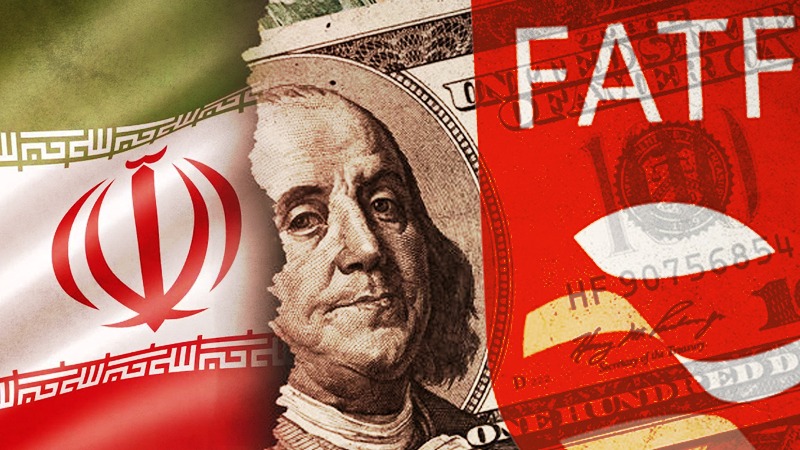One of the most complicated debates among politicians and economists in Iran is whether or not the country should join the Financial Action Task Force (FATF)… but what is the FATF and why has it become the center of such an important dispute?
The FATF is an inter-governmental body established in 1989 by the Ministers of G7 countries (US, France, UK, Germany, Japan, Italy and Canada) to fight money laundering, and, in 2001, it was expanded to include fighting financing for terrorist groups following the September 11 attacks.
The FATF is a “policy-making body” which works to generate the necessary political will to bring about national legislative and regulatory reforms in these areas.
FATF members meet every four months and issue a statement which assesses the level of risk in investment in various countries.
The FATF has 49 recommendations (40 to fight money laundry 9 against financing terrorism) which the 129 member countries are recommended to adhere to.
In order to meet the FATF’s requirements, countries are obliged to give them all their financial information.
The FATF considers two countries, Iran and North Korea, to be high-risk and non-cooperative jurisdictions, and called for both to apply counter-measures.
European Countries have also tied their plan to keep Iran in the JCPOA (Joint Comprehensive Plan of Action), now called INSTEX (Instrument in Support of Trade Exchange with Iran), with FATF membership, and asked Iran to implement the FATF’s recommendations if it wants to keep the deal.
Earlier, the Europeans insisted that Iran join the FATF as a part of a plan to develop an SPV (Special Purpose Vehicle) which was supposed to help Iran bypass the US sanctions, but they later changed their minds and offered INSTEX instead, which is a far less substantive agreement.
Due to economic sanctions imposed on Iran by the US since the Islamic revolution, Iranian merchants have been forced to find different ways to work around these sanctions. After the UN Security Council sanctions imposed on Iran in 2011, the Iranian financial sector was forced to take even more dramatic measures.
Most of the procedures the Iranians are using to bypass sanctions are considered money laundering, and therefore the FATF demands they be stopped in order to secure their recommendation.
Of course, it cannot be denied that some actually do use this gap for money laundering and that even the Iranian government would actually want to stop them.
After joining the JCPOA, the Iranian government was hoping that foreign countries would start business and investments in the Iranian economy.
In an attempt to encourage foreign investments in Iran, President Rouhani’s government even started a move towards implementing FATF recommendations after implementing Iranian promises made as a part of the JCPOA.
Some of these recommendations were implemented as internal orders issued by the Iranian central bank, which is under the control of the government, without officially announcing that they were part of FATF recommendations.
The Iranian government even started a parallel move to convince parliament to officially vote to join the FATF and implement all of its recommendations.
Of course, many powerful people who were benefiting from the lack of law and had become politically and economically powerful in Iran within the past decades considered this a threat, but the overall political move was stronger than them.
Another big dispute is the recommendations concerning ‘financing terrorism.’
The debate is mainly on identifying who counts as a ‘terrorist.’
When the US established Al-Qaeda to fight for US interests against the USSR, they were not considered to be a terrorist group, but when they turned against the US, they suddenly became terrorists.

When Arab countries who are members of FATF financed ISIS, the FATF didn’t make any moves against them.
Some members of the FATF consider Hezbollah and Hamas to be terrorist groups, while Iran considers them resistance groups fighting for liberation. Iran proudly announces that they help finance Hezbollah and Hamas.
In order to implement FATF recommendations, Iran would need to give all of its information on financing these resistance groups, which would naturally upset those who consider them terrorists and may even provoke increased sanctions!
The Iranian government says it would require amendments to the definition of the word “terrorist” before joining the FATF, but there are no guarantees their suggestions would be agreed to.
When Iran joined the NPT (Treaty on Non-Proliferation of Nuclear Weapons) before the Islamic revolution, the Shah signed the treaty on the condition that the Middle East be free from nuclear weapons. Afterward, rumors began that Israel possesses nuclear weapons and that even Saudi Arabia was able to buy nuclear weapons for Pakistan… yet, only Iran was sanctioned for its peaceful nuclear activities which were approved by the IAEA.
When Iran demanded that the IAEA inspect Israel for nuclear weapons before they sign the Nuclear Non-proliferation Treaty (NPT), they were informed that Israel could not be inspected by the IAEA because they hadn’t signed themselves.
After President Trump decided to exit the JCPOA and re-impose sanctions on Iran, the necessity to find ways to bypass sanctions became crucial again.
When Iran’s Foreign Minister, Dr. Mohammad Javad Zarif, defended joining the FATF in parliament, he plainly said that there is no guarantee that joining the FATF would benefit Iran economically.
But the Iranian government was hoping that if they join the FATF, it would encourage the EU to move faster on the SPV issue and help Iran legally bypass US sanctions.
The Europeans instead proposed INSTEX to the total disappointment of the Iranians.
Now, the voices opposing FATF membership have become even stronger.
Given the current situation, the Iranians are forced to use all methods available to bypass American Sanctions, and giving the FATF their banking information could allow the US to close the gaps and damage these efforts.
Another big concern is that if the FATF had the information, Iran’s allies in the regions could face financial problems if those channels were shut down.
As of right now, many decision-makers in Iran believe that joining the FATF would be of no benefit to Iran. Even if Iran joins it might still stay on the blacklist since US sanctions insist that the international financial system not cooperate with Iran, and that is unlikely to change.
Joining could even help the US treasury department find the holes in their system for imposing sanctions, which could hurt all of Washington’s enemies.
Yet, on the other hand, the Iranian government is not holding any cards after the Europeans failed to come through with their promises of an SPV.
The Iranian Expediency council had long discussions on this issue but was not able to reach a conclusion. The debate was postponed to be discussed again after Nowruz (Iranian New Year) vacations, but there is little hope that FATF membership will be approved.

















Leave a Reply